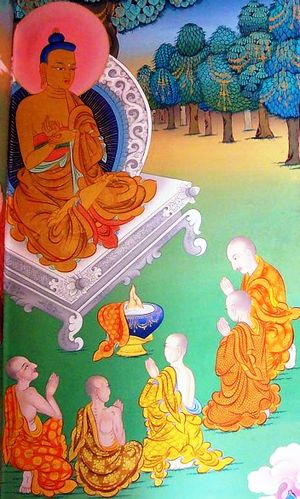Three Turnings: Difference between revisions
Jump to navigation
Jump to search
No edit summary |
No edit summary |
||
| Line 1: | Line 1: | ||
[[Image:Four Noble Truths.JPG| | [[Image:Four Noble Truths.JPG|thumb|[[Buddha Shakyamuni]] turning the Wheel of Dharma for the first time]]'''The Three Turnings of the Wheel of Dharma''' (Skt. ''tridharmacakra''; [[Wyl.]] ''chos 'khor rim pa gsum'') — the three major series of teachings given by the [[Buddha]], according to the Indo-Tibetan Buddhist tradition. To 'turn the wheel of [[Dharma]]' means to teach the Dharma. | ||
#The first turning took place in the [[Deer Park]] at [[Sarnath]], Varanasi, where Buddha taught the [[Four Noble Truths]].<br> | #The first turning took place in the [[Deer Park]] at [[Sarnath]], Varanasi, where Buddha taught the [[Four Noble Truths]].<br> | ||
Revision as of 09:22, 24 July 2009

The Three Turnings of the Wheel of Dharma (Skt. tridharmacakra; Wyl. chos 'khor rim pa gsum) — the three major series of teachings given by the Buddha, according to the Indo-Tibetan Buddhist tradition. To 'turn the wheel of Dharma' means to teach the Dharma.
- The first turning took place in the Deer Park at Sarnath, Varanasi, where Buddha taught the Four Noble Truths.
- The intermediate turning on the absence of characteristics took place on Vulture's Peak Mountain near Rajagriha.
- The final turning on the complete revelation took place in Vaishali and other places and included the sutras that explain the three natures, such as the Lankavatara Sutra.
Brief Explanation of the Three Turnings
Very simply,
- the first turning is mainly concerned with abandoning negative actions of the body, speech and mind.
- The second turning is primarily about abandoning clinging to the self of individual and of phenomena.
- The third turning is about abandoning clinging to emptiness.
According to Dilgo Khyentse Rinpoche, the three turnings can be related to the following quote from the Prajñaparamita sutras:
- “Mind is devoid of mind. The nature of mind is clear light.”
- "Mind" refers to the first turning where mind is spoken of as if it is inherently existent.
- "...is devoid of mind" refers to the intermediate turning and the teachigns on emptiness.
- "The nature of mind is clear light" refers to the final turning and the teachings on buddha nature.
The Nyingma View of the Three Turnings
According to the Nyingma School, the first turning is of provisional meaning, whereas the second and third turnings are both of definitive meaning.